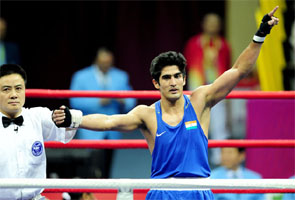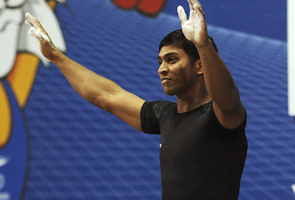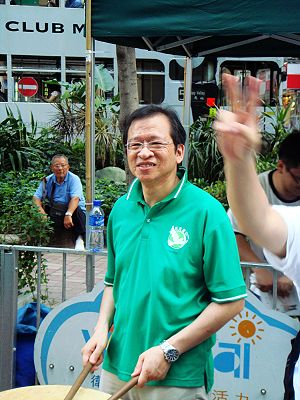
New Delhi: It started with an unprecedented gold rush and ended pretty much the same way as Indian boxers scaled new heights and broke new barriers with Olympic hero Vijender Singh once again leading the charge by clinching two gold medals and a bronze in a super successful 2010.
The season began with three gold medals in the South Asian Games in Dhaka in February with Chhote Lal Yadav (57kg), Asian champion Suranjoy Singh (51kg) and Amandeep Singh (48kg) finishing on top.
Just a month later, the boxers landed half a dozen gold medals with a cracker of a performance in front of adoring home fans in the Commonwealth Championships.
Trading punches in front of crowds that generally don't turn up for non-cricket sporting events in India, the sextet of Vijender (75kg), South Asian Games gold medallist Amandeep (49kg), Suranjoy (52kg), Asian silver medallist Jai Bhagwan (60kg), Olympian Dinesh Kumar (81kg) and Paramjeet Samota (+91kg) fetched gold to further enhance the sport's rising profile in the country.
This was Vijender's first gold medal in two years, adding to the aura of the strapping six-footer, who remained the world number one from beginning to the end of 2010 -- his supremacy at the top unchallenged.
The championship, in fact, was just a prelude to a fantastic performance in the Commonwealth Games that were to follow six months later, again in the capital.
In the build-up to the Games, Vijender and Co took went for a month-long trip to Cuba to get battle-hardened in the 'spiritual home of boxing' and the improvement was there to be seen when they finally took the ring in the main-event.
Even as the Commonwealth Games Federation complained of lack of crowds at CWG venues, the dome-shaped Talkatora Stadium was witness to an atmosphere which can only be described as electric in every single session of the boxing competition.
Fans queued up as the likes of Vijender, Suranjoy and Akhil Kumar (56kg) began their gold quest in the biggest sporting event India was hosting since the 1982 Asian Games.
It turned out to be a bitter-sweet campaign in the end with Vijender settling for bronze after a controversial loss in the semifinals and defending champion Akhil signing off without a medal following a quarterfinal defeat.
But Suranjoy, Manoj Kumar (64kg) and Paramjit Samota (+91kg) ensured that Indian boxing pulled off its best-ever performance in the Games history by notching up gold medals.
Besides their golds, four bronze came through Amandeep (49kg), Dilbagh Singh (69kg), Vijender and Jai Bhagwan (60kg) making CWG a memorable event for Indian pugilists.
But Vijender's loss was a massive disappointment as he went down without conceding a single scoring punch when the referee penalised him twice for clinching and holding on to his rival in the semifinal.
However, the poster boy of Indian boxing took the setback on his chin and promised a gold in the Asian Games which took place just a month later. And he delivered the goods at his happy hunting ground, China where the event was held in the city of Guangzhou.
There was skepticism that the boxers, who got just a month to rest and recover after the CWG, would under-perform in the Asiad but all such fears vanished once the competition began as Indian pugilists fetched two yellow metals at the event for the first time after Dingko Singh's gold in 1998.
In the end, the Indian boxers managed a brilliant haul of two gold, three silver and four bronze medals without showing any sign of fatigue.
The only disappointment of the event was Suranjoy settling for bronze after entering the event gunning for an eighth straight international gold. But that apart, the Asiad was an affair to remember for Indian boxing.
The 25-year-old Vijender's was the most dramatic final as he squared off against two-time world champion and old nemesis Abbos Atoev of Uzbekistan with a dislocated thumb. Fighting practically with just one hand, he still managed to blank his rival 0-7 in a completely lop-sided encounter.
Vijender aside, the Games boxing competition threw up a second unexpected gold medallist for India in 18-year-old Vikas Krishan (60kg).
The lanky boxer from Haryana, who incidentally looks up to Vijender for inspiration, was the find of the year along with another teen sensation Shiva Thapa.
The two made India proud at the Youth World Championships in May where Vikas clinched a gold, while Shiva settled for silver after fighting his final bout with a stress fracture in his hand. The duo proved themselves again a couple of months later at the inaugural Youth Olympics in Singapore where Shiva got a silver while Vikas came back with a bronze.
The men and the boys had a consistently good run but in the women's arena it was only 'The Magnificent' M C Mary Kom who made an impression.
The Manipuri mother of two added an unprecedented fifth world championship title to her kitty but the rest of the women boxers flopped at the September event, fetching just a bronze to go with Mary Kom's gold.
But women's boxing, in general, got a massive boost when the International Olympic Committee included it in the 2012 London Games roster. It also made its debut at a multi-sporting event in the Asiad where the Indian women pugilsits could only manage a couple of bronze medals through Mary Kom and Kavita Goyat.
The women's below-par show went unnoticed due to the brilliant performance of their male counterparts but theywill have to get their act together quickly enough to ensure that their London 2012 debut is a memorable one.
All in all, Indian boxing continued its upward march that began with Vijender's historic bronze in the 2008 Beijing Olympics and the graph should head northwards even next year, which has the men's World Championships and Olympic qualifiers lined up.
The season began with three gold medals in the South Asian Games in Dhaka in February with Chhote Lal Yadav (57kg), Asian champion Suranjoy Singh (51kg) and Amandeep Singh (48kg) finishing on top.
Just a month later, the boxers landed half a dozen gold medals with a cracker of a performance in front of adoring home fans in the Commonwealth Championships.
Trading punches in front of crowds that generally don't turn up for non-cricket sporting events in India, the sextet of Vijender (75kg), South Asian Games gold medallist Amandeep (49kg), Suranjoy (52kg), Asian silver medallist Jai Bhagwan (60kg), Olympian Dinesh Kumar (81kg) and Paramjeet Samota (+91kg) fetched gold to further enhance the sport's rising profile in the country.
This was Vijender's first gold medal in two years, adding to the aura of the strapping six-footer, who remained the world number one from beginning to the end of 2010 -- his supremacy at the top unchallenged.
The championship, in fact, was just a prelude to a fantastic performance in the Commonwealth Games that were to follow six months later, again in the capital.
In the build-up to the Games, Vijender and Co took went for a month-long trip to Cuba to get battle-hardened in the 'spiritual home of boxing' and the improvement was there to be seen when they finally took the ring in the main-event.
Even as the Commonwealth Games Federation complained of lack of crowds at CWG venues, the dome-shaped Talkatora Stadium was witness to an atmosphere which can only be described as electric in every single session of the boxing competition.
Fans queued up as the likes of Vijender, Suranjoy and Akhil Kumar (56kg) began their gold quest in the biggest sporting event India was hosting since the 1982 Asian Games.
It turned out to be a bitter-sweet campaign in the end with Vijender settling for bronze after a controversial loss in the semifinals and defending champion Akhil signing off without a medal following a quarterfinal defeat.
But Suranjoy, Manoj Kumar (64kg) and Paramjit Samota (+91kg) ensured that Indian boxing pulled off its best-ever performance in the Games history by notching up gold medals.
Besides their golds, four bronze came through Amandeep (49kg), Dilbagh Singh (69kg), Vijender and Jai Bhagwan (60kg) making CWG a memorable event for Indian pugilists.
But Vijender's loss was a massive disappointment as he went down without conceding a single scoring punch when the referee penalised him twice for clinching and holding on to his rival in the semifinal.
However, the poster boy of Indian boxing took the setback on his chin and promised a gold in the Asian Games which took place just a month later. And he delivered the goods at his happy hunting ground, China where the event was held in the city of Guangzhou.
There was skepticism that the boxers, who got just a month to rest and recover after the CWG, would under-perform in the Asiad but all such fears vanished once the competition began as Indian pugilists fetched two yellow metals at the event for the first time after Dingko Singh's gold in 1998.
In the end, the Indian boxers managed a brilliant haul of two gold, three silver and four bronze medals without showing any sign of fatigue.
The only disappointment of the event was Suranjoy settling for bronze after entering the event gunning for an eighth straight international gold. But that apart, the Asiad was an affair to remember for Indian boxing.
The 25-year-old Vijender's was the most dramatic final as he squared off against two-time world champion and old nemesis Abbos Atoev of Uzbekistan with a dislocated thumb. Fighting practically with just one hand, he still managed to blank his rival 0-7 in a completely lop-sided encounter.
Vijender aside, the Games boxing competition threw up a second unexpected gold medallist for India in 18-year-old Vikas Krishan (60kg).
The lanky boxer from Haryana, who incidentally looks up to Vijender for inspiration, was the find of the year along with another teen sensation Shiva Thapa.
The two made India proud at the Youth World Championships in May where Vikas clinched a gold, while Shiva settled for silver after fighting his final bout with a stress fracture in his hand. The duo proved themselves again a couple of months later at the inaugural Youth Olympics in Singapore where Shiva got a silver while Vikas came back with a bronze.
The men and the boys had a consistently good run but in the women's arena it was only 'The Magnificent' M C Mary Kom who made an impression.
The Manipuri mother of two added an unprecedented fifth world championship title to her kitty but the rest of the women boxers flopped at the September event, fetching just a bronze to go with Mary Kom's gold.
But women's boxing, in general, got a massive boost when the International Olympic Committee included it in the 2012 London Games roster. It also made its debut at a multi-sporting event in the Asiad where the Indian women pugilsits could only manage a couple of bronze medals through Mary Kom and Kavita Goyat.
The women's below-par show went unnoticed due to the brilliant performance of their male counterparts but theywill have to get their act together quickly enough to ensure that their London 2012 debut is a memorable one.
All in all, Indian boxing continued its upward march that began with Vijender's historic bronze in the 2008 Beijing Olympics and the graph should head northwards even next year, which has the men's World Championships and Olympic qualifiers lined up.

 Twitter
Twitter NDTV Social
NDTV Social Gmail Buzz
Gmail Buzz






















